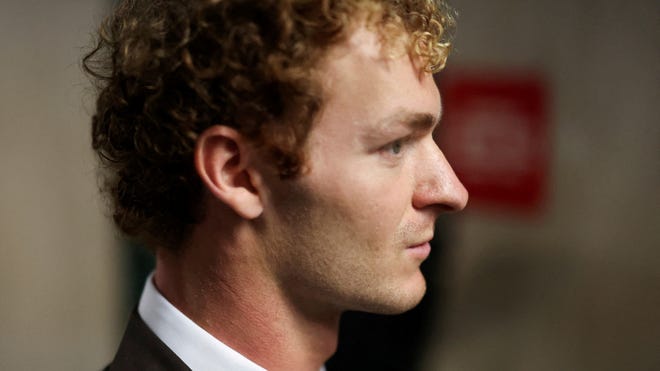Daniel Penny’s criminal trial over the death of Jordan Neely has become the latest cultural flash point underscoring deep divisions in how Americans view issues of race, crime and mental health in the United States.
A New York City jury found Penny, a former Marine, not guilty on charges of killing Neely, a homeless Black man, on the subway last year after placing him in a choke hold for roughly six minutes. Penny’s lawyers argued he did not intend to harm Neely and was trying to protect other subway passengers, who witnessed Neely screaming that he was hungry, thirsty and ready to kill someone.
On Friday, a judge in the case dismissed the more serious manslaughter charge after the jury was unable to come to a unanimous verdict – underscoring the divisive nature of the case and the controversial cultural topics at play.
Responses to the case, like many issues in America, have fallen along cultural and political lines, with conservative-leaning pundits and politicians describing Penny as a hero, and progressives and activist groups calling him a murderer.
The NAACP said it was “deeply disappointed” by the verdict and argued that acquitting Penny set a dangerous precedent that promoted vigilante justice.
“Let’s be clear ‒ mental health crises are medical emergencies, not crimes,” the organization wrote in a statement. “America has yet again criminalized our community and subverted accountability.”
Meanwhile, Vice President-elect JD Vance heralded the decision, saying that “justice was done” and that “it was a scandal Penny was ever prosecuted in the first place,” in a post on X, formerly Twitter, on Monday.
The dueling responses aren’t surprising, given the details of the case, said Nicole Brenecki, a Brooklyn-based trial expert.
“This is showing the polarization of society right now because all the issues that society is grappling with came together in this particular case,” Brenecki said, pointing to safety on the nation’s largest subway system, mental illness and the homelessness crisis.
Diverging viewpoints
Republicans and Democrats have emphasized different parts of the complicated case, drawing on their opposing views on cultural issues.
In the weeks after the incident, Republican lawmakers rallied in support of Penny, painting him as a hero whose actions helped protect the lives of others on the subway.
Much like Penny’s defense team, Republicans highlighted that Neely’s actions scared some passengers on the subway. Penny, they asserted, was not only acting out of self-defense but for the public good.
In a video testimony about the altercation, Penny said Neely appeared to be on drugs when he entered the subway, threw his jacket at people and yelled threats that he was going to kill, was prepared to go to jail and was willing to die.
Florida Gov. Ron DeSantis, a former Republican presidential candidate, called Penny a “Good Samaritan” in a tweet shortly after Neely died in May 2023. He described the charges against Penny as part of a pro-criminal “agenda” by Democrats.
DeSantis also criticized Democratic Manhattan District Attorney Alvin Bragg, who announced the charges against Penny. Bragg led the prosecution of President-elect Donald Trump’s New York hush money trial and has received ire from Republicans since.
On Monday, DeSantis commended the jury’s decision to acquit Penny of criminally negligent homicide in the death of Neely, saying it was “clearly the just and correct verdict.”
Rudy Giuliani, the former mayor of New York and a close Trump ally, called the verdict a “great act of justice” that rejected “racist, unjust charges.” He said Penny deserved a medal from the city for his actions.
In contrast, progressive Democrats described Neely’s death as emerging from systemic issues related to race, poor funding for mental health care and lack of social services for the homeless.
Neely, a street and subway performer, had experienced homelessness and poor mental health leading up to his death, according to lawyers for his family. His problems first started at age 14 when his mother was murdered and continued on and off for years.
If Neely had not been homeless, Rep. Alexandria Ocasio Cortez, D-N.Y., suggested he may have been treated differently when he entered the subway car.
“(Because) Jordan was houseless and crying for food in a time when the city is raising rents and stripping services to militarize itself while many in power demonize the poor, the murderer gets protected,” Ocasio-Cortez wrote in a tweet two days after Neely’s death.
Jamila Hodge, CEO of Equal Justice USA, a national nonprofit focused on racial justice and community safety, argued that the case surrounding Neely’s death is an example of how the criminal justice system fails to protect society’s most vulnerable members when they’re struggling and land in harm’s way.
“We are constantly reminded that the law is not enough,” Hodge, who is a former assistant U.S. Attorney, said, referencing a speech Martin Luther King Jr. gave in 1965. “Jordan Neely is dead and Daniel Penny has been acquitted because of the assumption of dangerousness that attaches to Black skin.”
Long term impact
Despite the political chasm, Brenecki said that while the cultural pieces of the case were important, there were other legal issues as well.
“If you bring this case down to its nuts and bolts, this case was not about all the other issues that were raised,” she said. “This case boiled down to whether the pressure that was applied to the victim’s neck was unreasonable or not.”
The “minutia of the legal decisions” governed how the case played out in court, Brenecki said, but the other details will continue to spark conversations about policy and public safety.
“The social and political discourse that results from them is very, very, very important for us to reflect upon,” she said. “At the end of the day, our governments and our legislators should be very, very busy acting upon our social discourse.”



